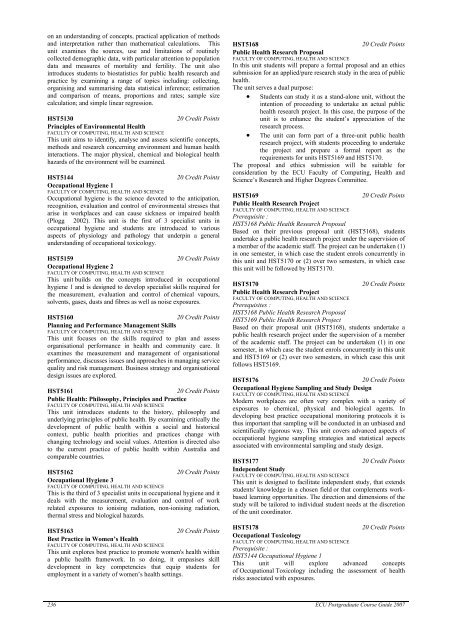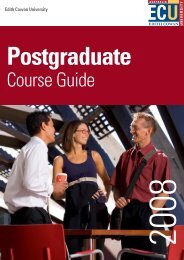Course Guide - Edith Cowan University
Course Guide - Edith Cowan University
Course Guide - Edith Cowan University
You also want an ePaper? Increase the reach of your titles
YUMPU automatically turns print PDFs into web optimized ePapers that Google loves.
on an understanding of concepts, practical application of methods<br />
and interpretation rather than mathematical calculations. This<br />
unit examines the sources, use and limitations of routinely<br />
collected demographic data, with particular attention to population<br />
data and measures of mortality and fertility. The unit also<br />
introduces students to biostatistics for public health research and<br />
practice by examining a range of topics including: collecting,<br />
organising and summarising data statistical inference; estimation<br />
and comparison of means, proportions and rates; sample size<br />
calculation; and simple linear regression.<br />
HST5130<br />
20 Credit Points<br />
Principles of Environmental Health<br />
FACULTY OF COMPUTING, HEALTH AND SCIENCE<br />
This unit aims to identify, analyse and assess scientific concepts,<br />
methods and research concerning environment and human health<br />
interactions. The major physical, chemical and biological health<br />
hazards of the environment will be examined.<br />
HST5144<br />
20 Credit Points<br />
Occupational Hygiene 1<br />
FACULTY OF COMPUTING, HEALTH AND SCIENCE<br />
Occupational hygiene is the science devoted to the anticipation,<br />
recognition, evaluation and control of environmental stresses that<br />
arise in workplaces and can cause sickness or impaired health<br />
(Plogg 2002). This unit is the first of 3 specialist units in<br />
occupational hygiene and students are introduced to various<br />
aspects of physiology and pathology that underpin a general<br />
understanding of occupational toxicology.<br />
HST5159<br />
20 Credit Points<br />
Occupational Hygiene 2<br />
FACULTY OF COMPUTING, HEALTH AND SCIENCE<br />
This unit builds on the concepts introduced in occupational<br />
hygiene 1 and is designed to develop specialist skills required for<br />
the measurement, evaluation and control of chemical vapours,<br />
solvents, gases, dusts and fibres as well as noise exposures.<br />
HST5160<br />
20 Credit Points<br />
Planning and Performance Management Skills<br />
FACULTY OF COMPUTING, HEALTH AND SCIENCE<br />
This unit focuses on the skills required to plan and assess<br />
organisational performance in health and community care. It<br />
examines the measurement and management of organisational<br />
performance, discusses issues and approaches in managing service<br />
quality and risk management. Business strategy and organisational<br />
design issues are explored.<br />
HST5161<br />
20 Credit Points<br />
Public Health: Philosophy, Principles and Practice<br />
FACULTY OF COMPUTING, HEALTH AND SCIENCE<br />
This unit introduces students to the history, philosophy and<br />
underlying principles of public health. By examining critically the<br />
development of public health within a social and historical<br />
context, public health priorities and practices change with<br />
changing technology and social values. Attention is directed also<br />
to the current practice of public health within Australia and<br />
comparable countries.<br />
HST5162<br />
20 Credit Points<br />
Occupational Hygiene 3<br />
FACULTY OF COMPUTING, HEALTH AND SCIENCE<br />
This is the third of 3 specialist units in occupational hygiene and it<br />
deals with the measurement, evaluation and control of work<br />
related exposures to ionising radiation, non-ionising radiation,<br />
thermal stress and biological hazards.<br />
HST5163<br />
20 Credit Points<br />
Best Practice in Women’s Health<br />
FACULTY OF COMPUTING, HEALTH AND SCIENCE<br />
This unit explores best practice to promote women's health within<br />
a public health framework. In so doing, it empasises skill<br />
development in key competencies that equip students for<br />
employment in a variety of women’s health settings.<br />
HST5168<br />
20 Credit Points<br />
Public Health Research Proposal<br />
FACULTY OF COMPUTING, HEALTH AND SCIENCE<br />
In this unit students will prepare a formal proposal and an ethics<br />
submission for an applied/pure research study in the area of public<br />
health.<br />
The unit serves a dual purpose:<br />
• Students can study it as a stand-alone unit, without the<br />
intention of proceeding to undertake an actual public<br />
health research project. In this case, the purpose of the<br />
unit is to enhance the student’s appreciation of the<br />
research process.<br />
• The unit can form part of a three-unit public health<br />
research project, with students proceeding to undertake<br />
the project and prepare a formal report as the<br />
requirements for units HST5169 and HST5170.<br />
The proposal and ethics submission will be suitable for<br />
consideration by the ECU Faculty of Computing, Health and<br />
Science’s Research and Higher Degrees Committee.<br />
HST5169<br />
20 Credit Points<br />
Public Health Research Project<br />
FACULTY OF COMPUTING, HEALTH AND SCIENCE<br />
Prerequisite :<br />
HST5168 Public Health Research Proposal<br />
Based on their previous proposal unit (HST5168), students<br />
undertake a public health research project under the supervision of<br />
a member of the academic staff. The project can be undertaken (1)<br />
in one semester, in which case the student enrols concurrently in<br />
this unit and HST5170 or (2) over two semesters, in which case<br />
this unit will be followed by HST5170.<br />
HST5170<br />
20 Credit Points<br />
Public Health Research Project<br />
FACULTY OF COMPUTING, HEALTH AND SCIENCE<br />
Prerequisites :<br />
HST5168 Public Health Research Proposal<br />
HST5169 Public Health Research Project<br />
Based on their proposal unit (HST5168), students undertake a<br />
public health research project under the supervision of a member<br />
of the academic staff. The project can be undertaken (1) in one<br />
semester, in which case the student enrols concurrently in this unit<br />
and HST5169 or (2) over two semesters, in which case this unit<br />
follows HST5169.<br />
HST5176<br />
20 Credit Points<br />
Occupational Hygiene Sampling and Study Design<br />
FACULTY OF COMPUTING, HEALTH AND SCIENCE<br />
Modern workplaces are often very complex with a variety of<br />
exposures to chemical, physical and biological agents. In<br />
developing best practice occupational monitoring protocols it is<br />
thus important that sampling will be conducted in an unbiased and<br />
scientifically rigorous way. This unit covers advanced aspects of<br />
occupational hygiene sampling strategies and statistical aspects<br />
associated with environmental sampling and study design.<br />
HST5177<br />
20 Credit Points<br />
Independent Study<br />
FACULTY OF COMPUTING, HEALTH AND SCIENCE<br />
This unit is designed to facilitate independent study, that extends<br />
students' knowledge in a chosen field or that complements workbased<br />
learning opportunities. The direction and dimensions of the<br />
study will be tailored to individual student needs at the discretion<br />
of the unit coordinator.<br />
HST5178<br />
20 Credit Points<br />
Occupational Toxicology<br />
FACULTY OF COMPUTING, HEALTH AND SCIENCE<br />
Prerequisite :<br />
HST5144 Occupational Hygiene 1<br />
This unit will explore advanced concepts<br />
of Occupational Toxicology including the assessment of health<br />
risks associated with exposures.<br />
236 ECU Postgraduate <strong>Course</strong> <strong>Guide</strong> 2007



